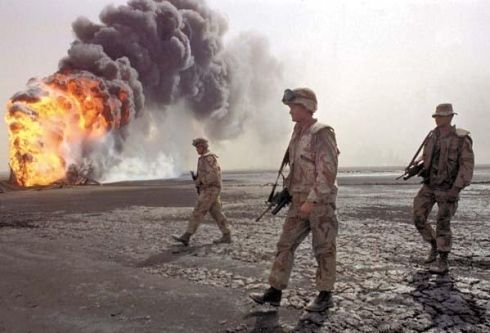Gulf War veterans may benefit from treatment with coenzyme Q10 (CoQ10), according to researchers at the University of California, San Diego.
Between a quarter and a third of the 700,000 US troops who served in the 1990-1991 Persian Gulf War suffer from a unique combination of health challenges, collectively known as Gulf War illness (GWI). Marked by chronic fatigue, headaches, widespread pain, decreased cognitive functioning, mood disturbances, gastrointestinal disorders, and skin conditions, GWI continues to affect vets decades later, though the war itself lasted less than two months.
GWI has been attributed to veterans’ wartime exposure to hazardous substances including Kuwaiti oil well fire smoke, pesticides and insect repellents, chemical nerve agents, and prophylactic medications given to troops to protect against the effects of chemical weapons (Steele, et al. Env Health Persp. 2012; 120(1): 112-118).
Kuwaiti oil well fire smoke, pesticides and insect repellents, chemical nerve agents, and prophylactic medications given to troops to protect against the effects of chemical weapons (Steele, et al. Env Health Persp. 2012; 120(1): 112-118).
In a study published earlier this month, investigators at the UCSD School of Medicine evaluated the efficacy of CoQ10 supplementation as a potential natural treatment for GWI. Commonly marketed as an over-the-counter health supplement, previous studies have used CoQ10 to successfully treat migraines, improve exercise performance, reduce inflammation, and lower blood pressure.
Forty-six veterans diagnosed with GWI participated in this double-blind, randomized, placebo-controlled study. Each received a daily dose of either 100 mg or 300 mg of CoQ10, or an identical-looking placebo (Golomb, et al. Neu Comp. 2014; 26(11): 2594-2651).
After three and a half months of treatment, a remarkable 80% of participants taking 100mg of CoQ10 daily showed significant improvements in physical functioning. Participants reported fewer headaches and memory problems, as well as reduced irritability, muscle pain, and fatigue with exertion. The benefits of treatment were found to correlate with increased levels of CoQ10 in the blood.
In a UCSD press release, principal investigator, Beatrice Golomb, MD, PhD, described the health risks associated with noxious chemical agents used during wartime. “These chemicals can damage mitochondria, which generate the energy our cells need to do their jobs. When these powerhouses of the cells are disrupted, it can produce symptoms compatible with those seen in Gulf War illness.”
CoQ10 is a naturally-occurring fat-soluble antioxidant found in cell membranes. Structurally similar to vitamin K, it is the “only known lipid-soluble antioxidant that can be synthesized de novo by animal cells.” Its role in the electron transport chain directly assists with mitochondrial energy production, supporting basic cell functioning and energy metabolism.
In describing the outcome of her GWI study, Dr. Golomb notes that despite its small sample size, the statistical significance of the vets’ improvements highlights the “large magnitude of [CoQ10’s] effects.”
As she further explains, the health benefits of CoQ10 may extend well beyond the veterans community. “Mounting evidence suggests findings in Gulf War illness are relevant to toxin-induced health problems in the civilian sector, so what we learn by studying health challenges of these veterans, will likely benefit others.”
END







